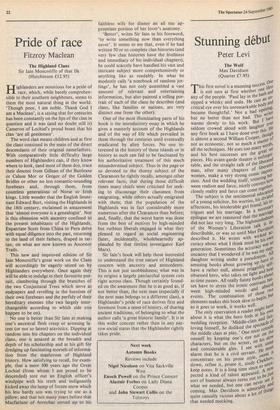Pride of race
Fitzroy Maclean
The Highland Clans Sir lain Moncreiffe of that Ilk (Hutchinson £12.95)
Highlanders are notorious for a pride of race, which, while barely comprehen- sible to their southern neighbours, seems to
them the most natural thing in the world.
'Though poor, I am noble. Thank God I am a Maclean', is a saying that for centuries has been constantly on the lips of the clan in question and it was (and no doubt still is) Cameron of Lochiel's proud boast that his clan 'are all gentlemen'.
The word clan means children and at first the clans consisted in the main of the direct descendants of their original namefathers.
With comparatively little difficulty large numbers of Highlanders can, if they know where to look, (and most of them do), trace their descent from Gillean of the Battleaxe or Calum Mor or Gregor of the Golden Bridles or other no less romantic-sounding forebears and, through them, from countless generations of Norse or Irish kings. Little wonder that the English lieute- nant Edward Burt, visiting the Highlands in the 18th century, exclaimed in amazement that 'almost everyone is a genealogist'. Nor is this obsession with ancestry confined to the present inhabitants of the Highlands.
Expatriate Scots from China to Peru delve with equal diligence into the past, returning to the land of their fathers, draped in tar- tan, on what are now known as Ancestor Trails.
This new and improved edition of Sir lain Moncreiffe's great work on the Clans will accordingly be eagerly seized on by Highlanders everywhere. Once again they will be able to indulge in their favourite pur- suit, clambering through the branches of the two Conjectural Trees which serve as endpapers and revelling in the heroism of their own forebears and the perfidy of their hereditary enemies (the two largely inter- changeable according to which side you happen to be on).
No one is better than Sir lain at making one's ancestral flesh creep or arousing la- tent (or not so latent) atavistics. Dipping at random into his chapters on the individual clans, one is amazed at the breadth and depth of his scholarship and at his gift for dredging up fascinating morsels of informa- tion from the maelstrom of Highland history. How satisfying to recall, for exam- ple, that a mere 300 years ago the Great Lochiel (from whom I am proud to be descended) tore out an English officer's windpipe with his teeth and indignantly kicked away the lump of frozen snow which his less hardy son was trying to use as a pillow; and that not many years before that Macfarlane of Arrochar served up to his faithless wife for dinner an all too ap- propriate portion of her lover's anatomy.
'Better', writes Sir lain in his foreword, 'to write something now than everything never'. It seems to me that, even if he had written 50 or so complete clan histories (and very few clan histories have the liveliness and immediacy of his individual chapters), he could scarcely have handled his vast and intricate subject more comprehensively or anything like as readably. In what he modestly calls 'a notebook of random jot- tings', he has not only assembled a vast amount of relevant and entertaining information, but also painted a telling por- trait of each of the clans he describes (and clans, like families or nations, are very distinct one from the other).
One of the most illuminating parts of his book is the introductory essay in which he gives a masterly account of the Highlands and of the way of life which prevailed in them through the centuries until eventually eradicated by alien forces. No one in- terested in the history of these islands or in history as such can fail to be fascinated by his authoritative treatment of this much misunderstood subject. Thus in the page or so devoted to the thorny subject of the Clearances he rightly recalls, amongst other relevant facts, that during those difficult times many chiefs were criticised for seek- ing to discourage their clansmen from emigrating, while others actually emigrated with them; that the population of the Highlands was in fact considerably more numerous after the Clearances than before; and, finally, that the worst harm was done from the best of motives by high-minded but ruthless liberals engaged in what they pleased to regard as social engineering (later, incidentally, wholeheartedly ap- plauded by that tireless investigator Karl Marx).
Sir lain's book will help those interested to understand the true nature of Highland concern with ancestry and antecedents. This is not just snobbishness; what was in its origins a largely patriarchal system cuts right across class. Though certainly found- ed on the awareness that he is as good as, if not better than, the next man (especially if the next man belongs to a different clan), a Highlander's pride of race derives first and foremost from a sense of history, of sharing ancient traditions, of belonging to what the author calls 'a great historic family'. It is in this wider concept rather than in any nar- row social status that the Highlander rightly takes pride.






































 Previous page
Previous page